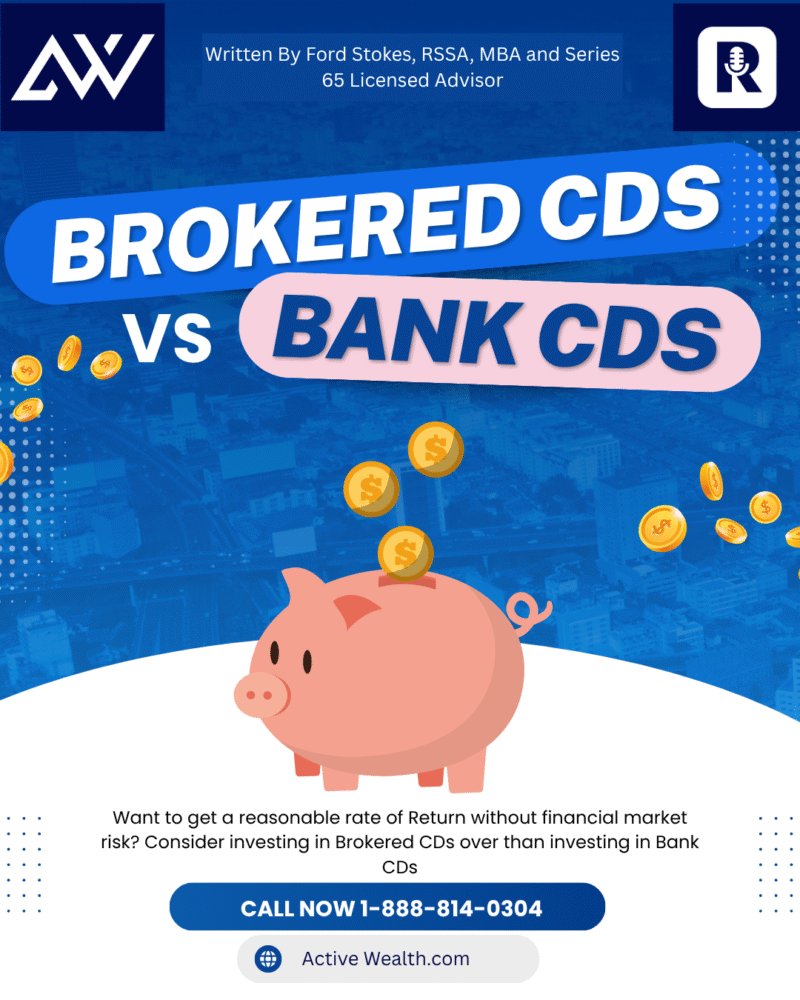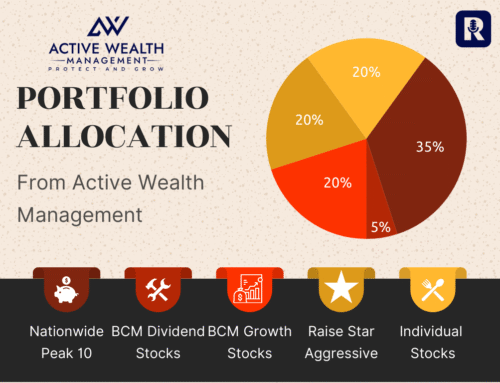
By Ford Stokes, RSSA, MBA
When it comes to preserving capital and earning a steady, predictable return, certificates of deposit (CDs) have long been a go-to choice for conservative investors. In a world filled with market volatility, rising interest rates, and economic uncertainty, CDs offer the peace of mind that comes with guaranteed returns—so long as the investor holds the CD to maturity.
But not all CDs are created equal.
As more investors seek safer havens for their savings, a key question emerges:
Should you buy a traditional bank CD—or opt for a brokered CD through your financial advisor or brokerage firm?
In this article, we’ll explore why brokered CDs often offer better benefits for conservative investors compared to bank CDs. We’ll walk through the differences, weigh the pros and cons, and show you how to take advantage of the brokered CD market to potentially earn more—without taking on unnecessary risk.
The Basics: What Are Bank CDs and Brokered CDs?
At their core, both bank CDs and brokered CDs are time deposits. You agree to lock in your money for a set period in exchange for a fixed interest rate.
- Bank CDs are issued directly by banks or credit unions and purchased by walking into a local branch or logging into your online banking portal.
- Brokered CDs are issued by banks but sold through brokerage firms, like Fidelity, Schwab, or through licensed financial advisors.
The key distinction? How you access them and how you manage them over time.
Bank CDs: Simple, but Limited
Bank CDs appeal to many investors because they’re easy to understand and come with FDIC protection (up to $250,000 per depositor, per institution).
Here’s a summary of their main features:
- Purchase: Directly from your bank or credit union.
- Yields: Often lower than brokered CDs due to limited competition.
- Liquidity: You’re typically locked in until maturity. If you withdraw early, you face early withdrawal penalties, often wiping out your earned interest—or more.
- Terms: Range from a few months to five years.
- Trading: Bank CDs are not tradable. Once you’ve committed, you must ride it out to the end.
For some, this level of rigidity is acceptable. But for savvy investors looking for better yield and flexibility, bank CDs may leave money on the table.
Brokered CDs: Higher Yield, Greater Flexibility
Brokered CDs are CDs sold through brokerage platforms or independent financial advisors. These CDs are still issued by banks—but because they are distributed in a competitive environment, they often offer significantly higher yields than their brick-and-mortar counterparts.
Here’s what makes brokered CDs appealing:
- Purchase: Through a licensed advisor or brokerage account.
- Yields: Often higher, due to competition among banks trying to attract investors via national brokerage platforms.
- Liquidity: Can be sold on the secondary market. You may be able to exit early without a penalty—though the price may fluctuate if interest rates have changed.
- Terms: Wide range, often including longer maturities not available at your local bank.
- Trading: Tradable, offering liquidity if you need access to your funds before maturity.
- FDIC Insurance: Still protected (up to $250,000 per bank, per depositor), but always verify how your account is titled and held.
Let’s Compare the Two Side-by-Side
| Feature | Bank CDs | Brokered CDs |
|---|---|---|
| Purchased Through | Bank or Credit Union | Brokerage firm or advisor |
| FDIC Insured | Yes (up to $250k per depositor) | Yes (verify structure and institution) |
| Yields | Typically lower | Often higher, due to broader competition |
| Terms Available | Limited (months to 5 years) | More flexible and longer durations |
| Liquidity | Locked in—penalties for early withdrawal | Can be sold on secondary market |
| Market Risk | None, unless you withdraw early | Possible if sold before maturity |
| Tradability | Not tradable | Tradable in secondary market |
| Best for | Set-it-and-forget-it investors | Savvy, yield-conscious conservative investors |
Why Conservative Investors Should Strongly Consider Brokered CDs
If you’re a retiree or pre-retiree focused on protecting your nest egg, a brokered CD strategy may offer the perfect balance of safety, income, and flexibility.
Here’s why:
✅ 1. Higher Yields in a Rising Rate Environment
In today’s competitive brokerage environment, banks compete to attract investor dollars. That means you benefit with higher interest rates than what you’d typically find at your local bank. Brokered CDs often yield 0.25% to 1.00% more than bank CDs for the same term.
On a $100,000 deposit, that’s an extra $250 to $1,000 per year—just by buying the same product in a smarter way.
✅ 2. More Term Options to Match Your Plan
Brokered CDs can offer terms as short as 3 months or as long as 10 to 20 years—far longer than most bank CDs. This allows investors to build a CD ladder, where maturities are staggered over time to take advantage of changing interest rates and maintain consistent liquidity.
✅ 3. Liquidity via Secondary Market Access
Unlike a bank CD, which locks your money away, brokered CDs can be sold before maturity. This gives you an exit option without facing harsh penalties—though the sale price will be based on prevailing interest rates. If rates have risen, your CD may sell at a discount, but you won’t be penalized in the traditional sense.
✅ 4. FDIC Protection Still Applies
Each brokered CD is issued by an FDIC-insured bank. As long as your total exposure per bank does not exceed $250,000, you are protected just like with a bank CD. In fact, many brokerages allow you to diversify across multiple banks, maximizing your coverage.
The Risks to Understand with Brokered CDs
While brokered CDs offer many advantages, they’re not without trade-offs:
- Market Risk (if sold early): If you need to sell your CD before maturity and interest rates have risen, your CD’s market value will fall. You may get back less than you invested.
- Complexity: The trading aspect, secondary markets, and multiple issuer options can overwhelm first-time buyers. That’s why working with a trusted advisor is essential.
- Brokerage Platform: Not all brokerages operate the same way. Some may offer better transparency, lower fees, or better selection than others.
How to Start Investing in Brokered CDs
If you want to secure higher interest rates, maintain FDIC coverage, and keep more flexibility in your investment, brokered CDs may be the better route for you.
And the good news is—it’s simple to get started.
You can schedule a free consultation with me directly at:
📅 https://calendly.com/fordstokes
Or you can contact our team to learn more:
📧 Email: ford@activewealth.com
📞 Toll-Free: 1-888-814-0304
We’ll help you:
- Evaluate your current savings and CD holdings.
- Compare rates from multiple FDIC-insured banks.
- Build a custom brokered CD ladder to match your retirement goals.
- Understand how to minimize risk while increasing your yield.
Conclusion: Brokered CDs = Smart, Safe, and Strategic
For conservative investors seeking more yield without sacrificing safety, brokered CDs offer a compelling solution.
They provide the predictability of fixed returns, the security of FDIC insurance, and the potential for better rates—all while offering more liquidity than traditional bank CDs.
In today’s uncertain economy, every extra dollar earned and every risk managed matters more than ever. Brokered CDs are one of the most underutilized tools in the retirement income toolkit—and now may be the perfect time to explore how they can work for you.
📌 Ready to put your savings to work more efficiently? Contact me today to explore brokered CDs that fit your conservative investment goals.
Ford Stokes, RSSA, MBA
Founder & President, Active Wealth Management
Host of the Retirement Results Radio Show
📧 ford@activewealth.com
📞 1-888-814-0304
📅 https://calendly.com/fordstokes
This content is for informational purposes only and does not constitute financial advice. Always consult a licensed financial advisor or your financial institution before making investment decisions. All brokered CDs are subject to market risk if sold before maturity.






